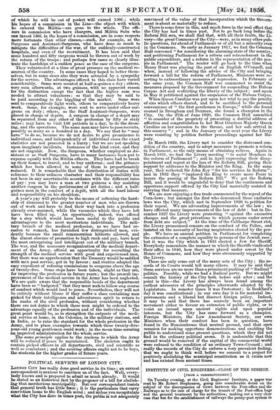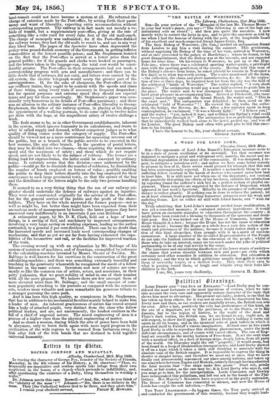On Tuesday evening, at the Civil Engineers' Institute, a paper
was read by Mr. Robert Stephenson, going into considerable detail on the suliect of the discrepancies of views between the Post-office and the ways as to the rate of charge for the transit of the Post-office bags and the general treatment by the authorities; making out a very clear case that but for the establishment of railways the penny-post system in land-transit could not have become a system at all. He rebutted the charge of extortion made by the Post-office, by setting forth their parsi- mony and want of liberality, expecting extra accommodation without corresponding payment. The railway is in fact made not merely a ve- hicle of transit, but a supplementary post-office, giving at the rate of something like a cube yard for every cube foot of the old mail-coach. The charge of monopoly was unfounded ; for if the Post-office disliked the railway terms, they had the old malls to resort to, and use in any way they liked best. The pages of the Spectator have often deprecated the penny-wise pound-foolish economy of the Government., in getting inferior commodities at the lowest possible prices ; and. Mr. Stephenson insisted on the fact that the Post-office is served at a lower price than the general public; for if the guards and clerks were booked as passengers, and the letters taken in the luggage-van, the total cost would be consi- derably greater. The Post-office in their arrangements had not made a corresponding progress with arts and manufactures ; and there can be little doubt that if railways did not exist, and letters were carried by the old system, the electric telegraph would usurp the greater part of the correspondence. If, for the sake of cheapness, the Post-office chose to use ordinary trains, they ought to be content with the speeds and times of those trains, using every train if necessary in frequent despatches ; but for special purposes and extreme speed they should use especial trains and pay for them accordingly. Mr. Stephenson's paper was occa- sionally very humorous in its details of Post-office parsimony ; and there was an allusion to the solitary instance of Post-office liberality to George Stephenson, the father of the railway system, in placing at his disposal the appointment of a walking postman, to do some eight to twelve miles per diem with the bags, at the magnificent salary of twelve shillings a week.
The fault seems to be, as in other Government establishments, inherent in the system, which ignores humanity in its calculations, and trusts to what is called supply and demand, without competent judges as to what quality of thing comes under the category of supply. The Post-office should be viewed not as a mere contrivance for squeezing revenue out of the public, but as a branch of the public service to be executed in the best manner, like any other branch. In the question of postal letters, they may be divided into two classes,—those requiring the maximum of speed and the maximum of safety ; and those which do not require speed, and are not likely to be the subject of robbery. The former are a Stang load for express-trains, the latter could be conveyed by ordinary trains. It certainly seems that this division—once understood by the public—would go far to diminish the number of robberies, by diminishing the number of hands employed on letters of value ; possibly enabling the public to drop their letters directly into the bag employed for their conveyance to each large provincial town, so that the opener of the bag and the distributor of the letters might be the only two persons handling them.
It seemed to us a very fitting thing that the son of our railway ori- ginator should undertake the defence of railways against an injustice. They were not constructed originally for the service of the Post-office, but for the general service of the public and the profit of the share- holders. They have on the whole answered the former purpose—not so well as might be, but better than might have been expected from their anomalous mode of management by boards : the latter purpose they have answered very indifferently in an uncertain 3 per cent dividend.
A subsequent paper, by Mr. D. R. Clark, held out a hope of better things, in a saving of fuel; and machinery by improved arrangements, involving a very large saving on working expenses, leading as the author contended, to a general 5 per cent dividend. There can be no doubt that the increased speeds and increased loads need corresponding changes of mechanism, and that as yet we are far from having exhausted the capa- bilities of the locomotive and rail, or the facilities for improved traction of the train.
The evening wound up with an explanation by Mr. Babbage of his system of notation of machines, and of drawings, exemplified by reference to the calculating-machine invented by Messrs. Sheutz of Sweden. Mr. Babbage is well known for his exertions in the construction of the great calculating-machine ; and there was something extremely beautiful and touching in the generosity wherewith he recognized the merit of a fellow tabourer in the same course. Inventors and men of science are com- monly so like the common run of artists, actors, and musicians, in their petty jealousies, that we greet nobility of mind in one of their number with all the more pleasure. We believe there are few amongst them of more elevated mind than Mr. Babbage ; and the small amount of com- mon popularity attaching to his pursuits as compared with the sensuous arts, renders more valuable and more remarkable his generous tribute to a stranger pursuing the same path. And it has been this high quality, so conspicuous in Mr. Stephenson, that has in addition to his mechanical faculties mainly helped to make him a leader of men. An inherent graciousness of nature has reared around him a body of attached pupils, very distinct from the class who follow political leaders, and are not uncommonly, the loudest exidters in the fall of a chief of =genial nature. The moral engineering of men is a process of a higher class than the physical engineering of matter. And so closes a session, during which the arts of peace have been held in abeyance, only to burst forth again with more rapid progress in the civilization of the wide regions to be rescued from barbarous sway, by link after link of the iron bands that are destined to hold together universal humanity.



































 Previous page
Previous page